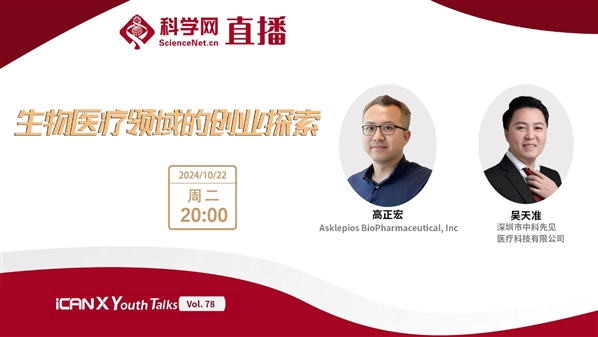
直播时间:2024年10月22日(周二)20:00-22:00
直播平台:

科学网APP
https://weibo.com/l/wblive/p/show/1022:2321325092283887517817
(科学网微博直播间链接)

科学网微博

科学网视频号
北京时间10月22日晚八点,iCANX Youth Talks第七十八期邀请到了Asklepios BioPharmaceutical, Inc非病毒递送部门的创始总监高正宏、深圳市中科先见医疗科技有限公司创始人吴天准主讲,浙江大学博士生导师刘帅、路易斯安那州立大学助理教授蔡琪担任研讨嘉宾,电子科技大学张翼教授担任主持人,期待你一起加入这场知识盛宴。
【嘉宾介绍】
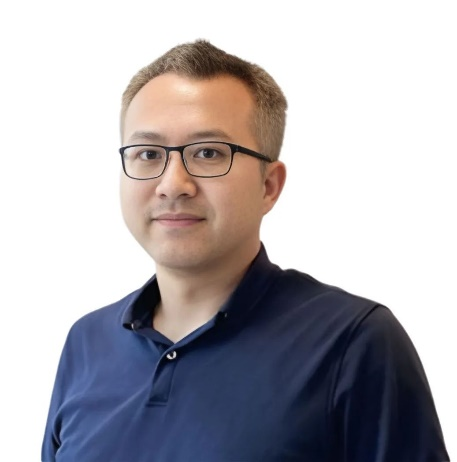
高正宏
Asklepios BioPharmaceutical, Inc
用于改进中枢神经系统药物递送的新型纳米技术
【Abstract】
This presentation will elucidate the challenges, complexities and recent advancements pertaining to the delivery of therapeutic molecules to extrahepatic tissues facilitated by novel nanoscale drug delivery system (nanoDDS). NanoDDSs have emerged as mainstream nanoscale carriers for a diverse array of therapeutic cargoes, including peptides, nucleic acids, and gene-editing tools, ushering in novel therapeutic paradigms. However, while these systems have demonstrated efficacy in hepatic tissue, extending their delivery capabilities to extrahepatic targets presents formidable challenges, particularly in tissues characterized by intricate biological barriers such as the central nervous system.To address this challenge, integrated strategies are being devised, encompassing fine-tuning tissue specific structure-property relationship of nanoparticle, local-environment responsive release mechanisms, advanced administration devices used in clinic practice, and receptor-mediated targeting delivery systems. These approaches aim to achieve precise and efficient delivery of therapeutic cargoes to challenging tissues to achieve therapeutic benefit, while minimizing off-target effects and systemic distribution.While several strategies have been explored in early-stage clinical trials to advance viral vector-based gene therapy in extrahepatic tissues, the full potential of nanoscale delivery remains to be realized for expanding the landscape of new therapeutic modalities. Recent preclinical investigations have showcased targeted nanoparticles delivery of versatile therapeutic molecules to central nervous system in disease relevant animal models, highlighting the potential for transformative therapeutic development in a wide range of diseases. With a special focus on CNS, this presentation will cover 1) remotely controlled nanotechnology for local modulation of blood brain barriers to facilitate the delivery of biotherapeutics; 2) super-resolution method coupled with single nanoparticle tracking for unveiling the drug diffusion barrier in the CNS-extracellular space (ECS) and its physiological properties, and impact on the drug delivery. These advancements represent significant strides in the field of nanotechnology-mediated extrahepatic tissue delivery and offer promising avenues for future therapeutic innovation and clinical translation.
新型纳米级药物递送系统已成为多种治疗载荷(包括肽、核酸和基因编辑工具)的主流递送载体,从而开辟了新的治疗范式。然而,尽管这些系统在肝脏组织中显示出疗效,但将其递送能力扩展到额外肝脏靶点面临着巨大的挑战,特别是在具有复杂生物屏障的组织中,例如中枢神经系统(CNS)。为了解决这些挑战,一些创造性的协同策略正在被探索和开发。这些策略包括微调纳米颗粒的组织特异性结构-性质关系、开发局部环境响应释放机制、在临床实践中使用先进的给药装置,以及实施受体介导的靶向递送系统。这些方法的目标是实现对具有挑战性的组织的治疗载荷的精确和高效递送,最大化治疗效益,同时最小化脱靶效应和系统分布。尽管在早期临床试验中探索了多种策略以推进基于病毒载体的基因治疗在额外肝脏组织中的应用,但纳米级递送系统的全部潜力仍有待实现,以扩展新治疗方式的范围。最近的临床前研究展示了通过纳米颗粒将多种治疗分子靶向递送到疾病相关动物模型的CNS,突出显示了在广泛疾病中进行变革性治疗开发的潜力。本次演讲将聚焦CNS药物递送,内容包括:1)用于局部调节血脑屏障以促进生物治疗剂递送的远程控制纳米技术;2)结合单颗粒追踪的超分辨率方法,揭示CNS-细胞外空间(ECS)中的药物扩散屏障及其生理特性和对药物递送的影响。这些进展在纳米技术介导的额外肝脏组织递送领域代表了重要的进展,并为未来的治疗创新和临床转化提供了有希望的途径。
【BIOGRAPHY】
Dr. Gao is a creative scientist specializing in innovative nanoscale delivery technology for enabling new drug discovery and development. With over ten years of experience at leading academic research institutions and biotech companies, he is actively engaged in advancing biomedical research, developing new technologies, and translating them into medical applications. His extensive research portfolio includes nanomedicine, molecular imaging, liquid biopsy, medical devices, gene delivery, nanoparticle diffusion, and gene therapy and genomic editing. Over the years, Dr. Gaos has pioneered several nanoscale delivery technologies to understand and overcome biological barriers in the central nervous system, including brain-extracellular space (Nature Nanotech.; 2017; Nanomaterials 2017; Polym J., 2018; ACS Nano 2017) and blood-spinal cord barrier (BioRxiv., 2022; ACS Nano 2024, submitted), for improved drug and gene delivery (Nanoscale Adv., 2024); he has also developed integrated molecular targeting techniques for the early detection of cancers (Sci. Rep., 2017) and conducted "First-in-human" clinical trials (Gastroenterology 2017).Currently, Dr. Gao serves as the Director and Head of Non-Viral Delivery Department at Asklepios BioPharmaceutical, Inc., a flagship gene therapy company under Bayer. In this role, he leads a team dedicated to advancing non-viral vector-based drug delivery and novel nucleic acid for enabling new generation of life-saving medicine, such as therapeutic gene augmentation and genomic editing. Previously, Dr. Gao was an Assistant Professor at University of Texas at Dallas, with affiliation to UT Southwestern Medical Center. Dr. Gao has received several prestigious awards, including the DOD Therapeutic Idea Award for ALS treatment. He has published over 40 articles in journals such as Nature Nanotechnology, Journal of the American Chemical Society, and Gastroenterology, etc, and is a sought-after keynote speaker. He holds several US patents, and his research has been featured in Science and Nature.
高正宏博士是专注于创新药物和递送技术开发的科学家。他在顶级学术机构和制药行业拥有十多年的工作经验,一直活跃在生物医学研究的前沿领域,积极推动基础研究和医学转化。研究内容涵盖纳米医学、分子成像、液体活检、医疗设备、基因递送、药物扩散和基因编辑等多个领域。他还参与了多个IND申报,以进行“First-in-human”临床实验。高博士在临床前转化医学方面拥有丰富经验,涉及多种疾病,包括神经退行性疾病、脊髓损伤、中风、慢性疼痛、胃肠肿瘤学和癌症免疫治疗等。多年来,他开创了多项纳米递送技术,以克服中枢神经系统中的生物屏障,改善药物和基因递送。他还开发了几种分子靶向技术,用于早期检测难治性疾病。目前,高博士担任Asklepios BioPharmaceutical, Inc.非病毒递送部门的创始总监和部门负责人。他领导的团队,致力于推动基于脂质纳米颗粒递送和基因编辑平台的多项创新药物IND申报。作为项目的主要负责人,他还领导着一个跨公司合作团队,探索下一代基因递送和重写技术。高博士曾获得多个奖项的认可,包括美国国防部的渐冻症治疗创意奖。他在《自然纳米技术》、《美国化学会志》、《肠胃学》等顶级期刊上发表了40多篇文章,并多次受邀在国际会议上做邀请报告和主题演讲。他获得了多项美国专利,他的研究成果多次受到《科学》和《自然》期刊的报道。高博士毕业于兰州大学,从东京大学获得博士学位。
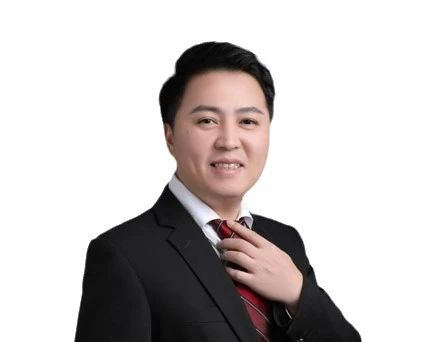
吴天准
深圳市中科先见医疗科技有限公司
“芯片+医疗”在精准诊断中的研究及产业化实践
【ABSTRACT】
Chip technologies based on semi-conductor such as microfluidics, bioMEMS and so on have achieved rapid progress and broader applications. The precision, mass production and powerful integration capacity of semi-conductor technology have endowed a fully new perspective and system reconfiguration ability for precision diagnostics. This talk will share our innovative researches and industrial practices in Shenzhen, China in the recent 10 years. We have explored the “Chip+Medicine” technology platform towards the commercialization in single-molecular ultra-sensitive detection and point-of-care technology (POCT). We will exhibit the highly integration and digitalization potential of the advanced biochips, especially the huge advantages for the population of precision medicine in the field of high-sensitivity in vitro diagnostics (IVD). New concept to realize “A chip is an instrument, as well as a consumable” can be achieved based on the world-first high-efficiency monodisperse particle array and low-cost, high-precision multiple-casting processes, to enable the fast spread of nowadays expensive single-molecule detection to primary health care even finally at-home self-testing. We will briefly introduce how CAS-Envision, the spin-off from Shenzhen Institutes of Advanced Technology, Chinese Academy of Sciences (SIAT CAS), converted the intelligent patents into products and explored the commercialization approaches focusing on “Chip+Medicine”. My personal experiences and opinions on “Scientist Entrepreneurship” will be shared at the end.
基于半导体工艺的芯片技术如微流控芯片、生物微机电系统,在本世纪以来在医疗领域取得快速进步和越发广泛的应用。半导体技术的精确、批量生产和强大的多功能集成能力,为精准诊断领域提供了全新视角和系统重构能力。本次报告将介绍近10年在中国深圳的创新研究及医疗器械的产业实践,综合采用MEMS/微流控/微纳工艺等半导体技术与仿生表界面的交叉研究,探索“芯片+医疗”的技术平台在单分子超灵敏检测及即时检测(POCT)的商业化路径。我们将展示先进生物芯片具有高度集成化、数字化能力,特别在高灵敏体外检测(IVD)领域具备“精准医疗普惠化”的巨大优势。依靠国际首创的高效单分散颗粒阵列和低成本、高精密的多重转印工艺,逐步实现“芯片即仪器,芯片即耗材”的新理念,助力目前昂贵的单分子检测短期内普及到基层医疗乃至居家自测。最后介绍孵化于中国科学院深圳先进院的中科先见公司围绕“芯片+医疗”的成果转化和商业探索的创业历程,分享科学家创业的经验教训。
【BIOGRAPHY】
Tianzhun Wu obtained the bachelors and masters degree from the Department of Precision Instruments at Tsinghua University, and the Ph.D. from the University of Tokyo. After that, he served as a postdoctoral researcher at the University of Tokyo and Osaka University, and a lecturer at Sun Yat-sen University. In 2013, he joined the Shenzhen Institutes of Advanced Technology, Chinese Academy of Sciences (SIAT CAS) as an associate professor, where he founded the Center for Micro/Nano Systems and Bionic Medicine. In 2016, he was promoted to full professor and Ph.D. supervisor. In terms of industrialization, in 2018 he founded CAS-Envision Medical Technology Company and in 2021 the subsidiary company Shenzhen Bloom Origin Semiconductor. In 2022 he was granted the financial support funded by the Nanshan government to lead the IVD Innovation Platform, National Technology Innovation Center in Guangdong-Hong Kong-Macao Greater Bay Area. So far his accumulation of R&D grant budget is more than 180 million RMB in the area of semiconductors and medical devices. Dr. Wu has nearly 20 years of R&D experience and industrial practice in semiconductors and biomedicine, with research interests including BioMEMS, MicroTAS, nanomaterials, biomimetic interfaces, and neuroelectronics. He has published more than 60 SCI papers and over 100 EI papers, and holds more than 100 domestic and international invention patents (more than 50 among them have been transferred or industrialized). He has been granted as an outstanding youth of the Guangdong Natural Science Foundation and Caliber B of the Shenzhen Peacock Plan. He has once served as a technical committee member (TPC) of IEEE MEMS, senior member of IEEE, a director of the Chinese Society of Micro and Nano Technology, a executive committee member of the Health Data and Digital Medicine Branch of the CPAM, a member of the Standardization Committee of the Chinese Society of Biomedical Engineering, and so on.
吴天准,清华大学精密仪器系本科、硕士,东京大学博士,历任东京大学及大阪大学博士后、中山大学讲师。2013年作为副研究员加入中国科学院深圳先进技术研究院,创办微纳系统与仿生医学研究中心,2016年破格晋升研究员、博导。在产业化方面,2018年创办中科先见医疗科技公司,2021年孵化芯片子公司深圳市勃望初芯半导体,2022年获批主持南山政府资助的粤港澳大湾区国创中心IVD创新平台项目,累计承担半导体及医疗器械类研发项目金额逾1.8亿。吴博士有近20年的半导体及生物医学的研发经验及产业化实践,研究兴趣包括生物微机电系统(BioMEMS)、微全分析系统(MicroTAS)、纳米材料、仿生界面、神经电子等。他发表了60余篇SCI论文,100余篇EI论文,拥有逾100个国内外发明专利,其中50余专利已授权并产业化。曾入选广东省自然科学基金杰出青年和深圳市孔雀计划B类,担任IEEE MEMS的技术委员(TPC)、IEEE高级会员、中国微米纳米技术学会理事、中国医促会健康数据及数字医学分会常委、中国生物医学工程学会标准委员会委员等。
【主持人】
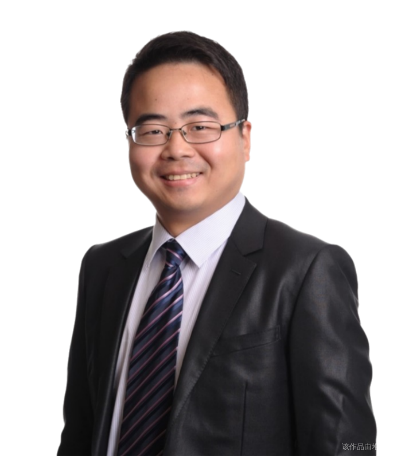
张翼
电子科技大学
【研讨嘉宾】
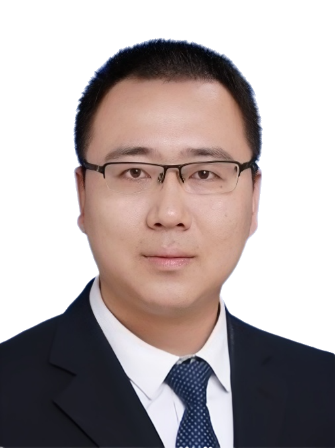
刘帅
浙江大学
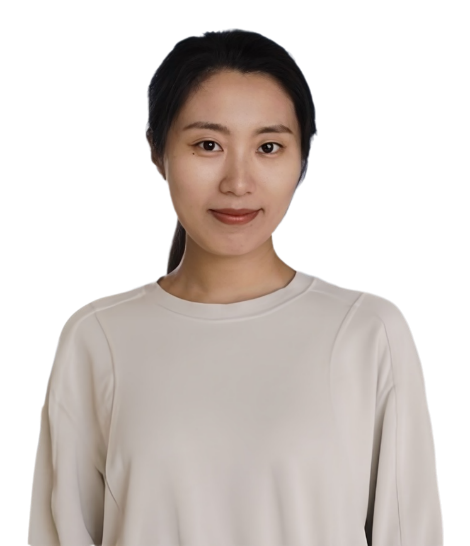
蔡琪
路易斯安那州立大学
特别声明:本文转载仅仅是出于传播信息的需要,并不意味着代表本网站观点或证实其内容的真实性;如其他媒体、网站或个人从本网站转载使用,须保留本网站注明的“来源”,并自负版权等法律责任;作者如果不希望被转载或者联系转载稿费等事宜,请与我们接洽。